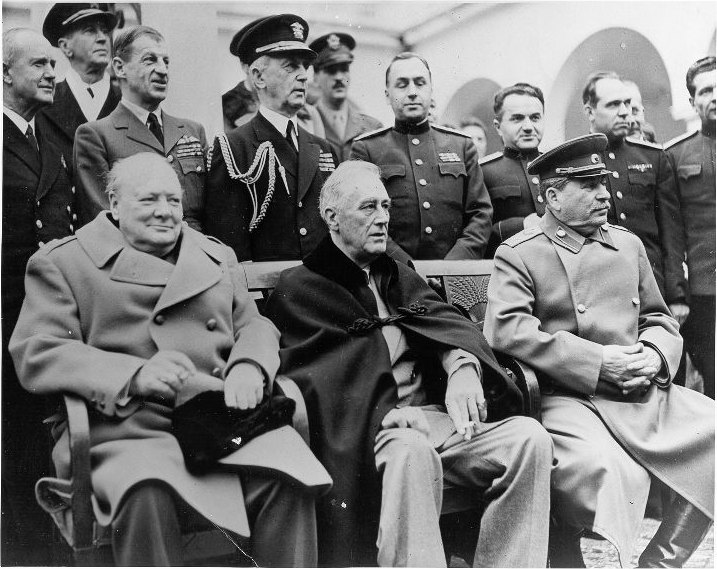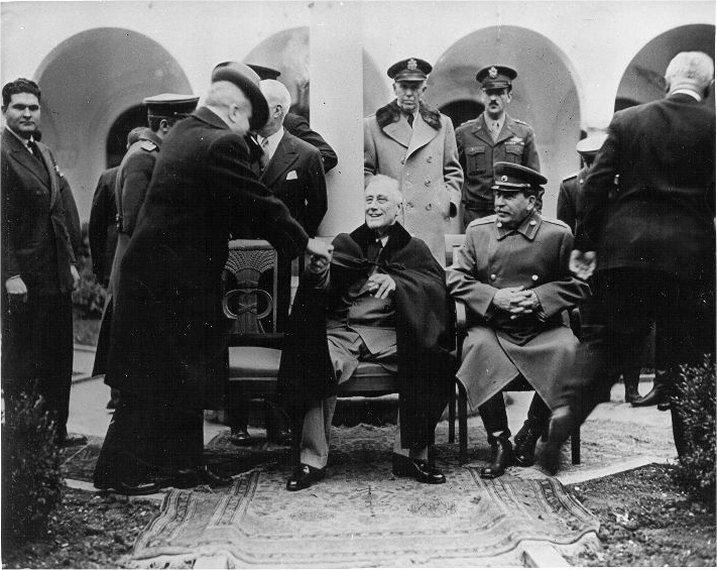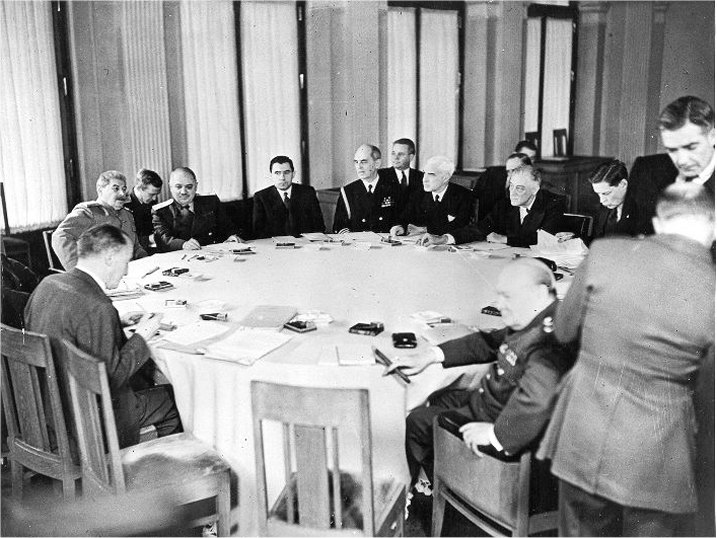![]()
The Charlotte News
Tuesday, February 13, 1945
FOUR EDITORIALS
![]()
![]()
Site Ed. Note: The front page reports that the Big Three Conference, concluded Sunday at
For the first time, American foreign policy had committed to participation in European affairs to insure the establishment of representative democratic interim governments in liberated countries until such time as free elections could be held. The foreign ministers of the Big Three were scheduled to meet every three or four months following the San Francisco conference to discuss these issues.
The government of Poland, as urged by the United States and Great Britain, was to be determined by all three allies acting in concert to establish a representative government and hold free elections quickly. All of the Big Three had agreed that Russia was to be awarded territory in Poland to the Curzon Line, with some modifications up to five miles to be given to Poland. Among the undisclosed modifications was thought to be the award to Poland of Brest-Litovsk. In return for ceded territory, Poland would receive parts of eastern Germany, East Prussia, and Upper Silesia, from which existing German populations would be transferred.
These territorial changes had been proposed and discussed openly for months and thus came as no surprise. The Polish government-in-exile in London, however, denounced the agreement as violating the spirit and letter of the Atlantic Charter.
Yugoslavia's government was also determined, without regard to King Peter's objections.
The agreement was hailed by both Republicans and Democrats on Capitol Hill as a major achievement.
In Germany, Nazi propagandists denounced the agreement as the product of "the Jew, the wandering Jew", that it represented the "hate program of Yalta" and was "a crime against mankind and humanity". The DNB proclaimed that the intent was to destroy Germany, to split it up the country and "rob" German industry, set up courts which would "continue mass slaughter of German men, women, and children" and send any survivors into "slave labor"—if so, representing little change from existing Nazi policy, though the report did not stress that.
It was believed that the coincidence of the April 25 designated meeting date for the San Francisco conference and the termination date for the non-agression treaty between Japan and Russia, by which date renewal had to be effected or not for five years, was significant, indicating a determination by the Soviets to join the Pacific war by that time.
On the Western Front, the British Second Army and the Canadian First Army continued to make progress east and south of captured Kleve, while, to the north, the Canadians entered Greithausen, less than a mile from the flooded Rhine and twenty miles from Wesel in the Ruhr. At Greithausen, the Western Allies were within three hundred miles of Berlin for the first time—compared to the Russians, reported 31 miles from the capital.
The Germans were reported to have tripled their forces in the Kleve sector, now amassing seven of their best divisions to try to hold the line at the Rhine.
Canadian, British, and Scotch troops had moved through the Reichswald fir forest to its eastern edge, but rain, coupled with flooding from the Rhine, had slowed further progress.
In the center of the front, the Third Army broke through at a new position along the Siegfried Line opposite the Luxembourg frontier.
For the first time in five days, Fifteenth Air Force heavy bombers out of Italy flew sorties, hitting targets in Austria and Yugoslavia.
On the Eastern Front, Budapest fell finally to the Russians, having been under siege for a month and a half. Fully 110,000 German and Hungarian prisoners were taken in Buda on the western side of the Danube. Pest on the eastern side had been cleared of enemy forces on January 12. The capture opened the way for further forces to join the Russian drives to Venice and Praguen.
Other Russian forces advanced to within 70 miles of Dresden on the Bober River front, forming a flanking threat to Berlin from the south. To the north, the forces drove toward Sommerfeld, 70 miles southeast of Berlin, to within 17 miles of joinder with the First White Russian Army moving toward Berlin.
Other forces of the First White Russian Army northeast of Berlin were six or seven miles from Stargard which in turn was 20 miles from Stettin.
In Italy, it was announced that the four-day battle beginning Thursday between the Germans and the 92nd Infantry Division, comprised wholly of African-Americans, resulting, as already reported, in the Americans being pushed back after effecting gains of 2.5 miles to within 2.5 miles of Massa, had in fact produced heavy American tank losses and casualties consequent of the fierce German counter-offensive.
In Manila, the 37th Infantry, First Cavalry, and Eleventh Airborne Divisions converged to trap the Japanese against Manila Bay to the south of the Pasig River, signaling the final operations to clear the city of enemy resistance. The Japanese had been confined to less than five square miles of Manila, but were still contesting every inch of ground. American bombers hit Bataan and Corregidor to prevent escape to those fortress locations, the same to which Americans and Filipinos had fled from Manila when it was overrun by the Japanese in December, 1941.
On the editorial page, (of February 13, not, as stated on the masthead for the third time in a row, February 10), "A Hope Is All" remarks on a plea made from American Catholic laymen to the Big Three meeting at Yalta the previous week, seeking from the three heads of state an expression of a ban on racial and religious discrimination in the brave new world being fashioned.
While a principle worthy of suggestion and implementation, opines the editorial, it was one quite impossible at the time of practical consideration for the extant facts present in the world: the United States practiced discrimination within its borders such that certain members of Congress, especially those of the South, would resist any such pronouncement or effort at implementation of such a principle; South Africa, where blacks outnumbered whites four to one, was ruled exclusively by whites, causing enormous suffering and discrimination; Australia and New Zealand barred Asiatic immigration; and most nations of the earth, including Russia, practiced some form of religious or racial discrimination.
An anti-discrimination plank, which had been advanced by Japan for inclusion in the League of Nations Covenant in 1919, had been approved by a vote of 11 to 6; but President Wilson as chair of the council had ruled that the vote was non-binding for want of unanimity.
Thus, while laudable, it was wholly incompatible with world conditions, argues the piece, for the conference to accept any such proposal.
"Cock Robin" remarks on the return of the red-breasted robins to Charlotte, harbingering the first breaths of spring. Soon, they would migrate further north toward their summer quarters in upstate New York and New England. The robin arrived without song or fanfare, was the press agent for the throngs of
It would appear that associate editor Burke Davis was eager for
"Here
Now, all the editors had to do, it assays, was to figure out what meant the phrase, at which point of clarity, they were certain of revelation of the omniscient solution by
Actually, when you parse it a little, the concept is churlishly facile, once the underlying component properties are embraced and arranged from their parts into a picture of lasting impact on the mind, so much so possessed of lucidity and savantry that the phrase, constituting a true chef d'oeuvre of the turbidity of the meistersinger in itself, becomes minor miracle of ingenuity, in the hands of those, that is, right honorables, possessed of exceptional
"The Go-By" imagines a scenario whereby, should the German develop a trans-Atlantic rocket which could hit Charlotte, it would inevitably be changed of course by the fact of the reconnaissance report to German headquarters indicating that, for the pall of thick smoke overhanging the city, Charlotte appeared already struck.
The piece makes the point that Charlotte had a smog problem, had since before the war began, remedial action having been tabled for the
The excerpt from the Congressional Record finds Representative Cochran of Missouri making a point of parliamentary inquiry regarding the bill to separate the RFC from the Department of Commerce.
Representative John Rankin of Mississippi interrupted to object that the point being raised was not in fact a point of parliamentary inquiry.
Mr. Cochran protested, continuing to assert that the bill was before the wrong committee.
Mr. Rankin sought a joint resolution co-sponsored by Mr. Cochran for unanimous consent that the bill be voted at once on the floor without being assigned to any committee, which Mr. Cochran abruptly refused.
Mr. Rankin contended that Mr. Cochran was out of order, to which Mr. Cochran responded that Mr. Rankin was not in charge of the House, and that the Speaker, who was, had not ruled him out of order, to which Mr. Rankin retorted that he was not intending to try to run the House.
Drew Pearson reminds that preceding Jesse Jones as chair of the RFC, had been another Democrat, Atlee Pomerene, former Senator from Ohio. Senator Pomerene had assisted in tracking the holdings of the oil companies involved in the Teapot Dome scandal of the Harding Administration. Secretary of Treasury Andrew Mellon during the Hoover Administration recommended in 1932 to President Hoover that he appoint Senator Pomerene as RFC chair rather than Jesse Jones whose business judgment he found questionable. Mr. Jones was a member at the time of the RFC.
After the election of FDR in 1932, Mr. Jones visited the President-elect and made the case for his becoming chairman, pointing out that he had supported the nomination of FDR at the convention whereas Senator Pomerene had supported the 1928 nominee Al Smith to repeat as the 1932 nominee. Mr. Jones stated that he had swung the Texas delegation to FDR's camp. Mr. Pearson points out parenthetically that, while it was true Senator Pomerene did not support Roosevelt, he had also not supported Al Smith but rather the former Governor of Ohio. In any event, Mr. Jones was awarded the chairmanship, primarily for his campaign contribution, not his business acumen.
Thus, points out Mr. Pearson, there was little distinction to be made between the reasons for appointment originally of Jesse Jones as RFC chair from those stated by President Roosevelt as the basis for appointing former Vice-President Wallace to the position of Secretary of Commerce, with its attendant duties as RFC chair as presently constituted. But, he also states, Senator Pomerene had gone back to Ohio, quietly resigned to his replacement by Mr. Jones; Mr. Jones, by contrast, had launched a bitter campaign against Henry Wallace and the President for having been ousted.
Dorothy Thompson, writing in advance of the announced results of the Big Three conference, proposes what it had to accomplish, namely cooperation in settlement of Europe in such a way that another war would not result.
She suggests that the conference resembled in historical importance the council which determined the fate of France and Napoleon. Napoleon, like Hitler, had staked his claim on the Holy Roman Empire. She notes a distinction, however, in the fact that the council which determined Napoleon's fate had consisted of all nations of Europe, whereas the present conference only consisted of the United States, Russia, and Great Britain. Moreover, Napoleon had been deserted by the French Bourbons and Republicans alike, thus enabling inclusion of these French opposition forces in the settlement.
Leland Stowe writes, in a special piece on the page, of his recent trip to France in which he found the sentiment abounding, as all over liberated Europe, that the Nazis and Gestapo had to be forced to pay for their atrocities, that retribution was the primary concern of these people, living displaced lives and still barely able to have enough food to sustain life. The commissions set up to mete punishment to war criminals were moving with glacial slowness, parsing words and phrases on legalities, meaningless to the masses who were desirous of instant justice.
In Paris, where the system was the most proficient of the liberated sectors, 350 war criminals had been tried, convicted, and sentenced to death; 200 of those had been executed. Still, collaborationists were known to be freely walking the streets of Paris with impunity and the fact created anger and frustration on the part of the French who had suffered for four years under the Nazi boot heel.
In Greece, hardly any of the war criminals and collaborationists had been tried.
Mr. Stowe concludes that if the Anglo-American system of justice did not improve the efficiency of the war crimes tribunals, then they would inevitably find that Europeans would turn for solace to the only available alternative to Western democracy, Communism.
Samuel Grafton points out that, for several years, about 70 Southern Democrats in the House and 15 in the Senate had been combining with Republicans on almost every major piece of legislation to oppose Administration-backed measures.
Senator Walter George of Georgia, who had proposed the bill to strip the Reconstruction Finance Corporation from the authority of the Secretary of Commerce to enable confirmation of Henry Wallace with limited powers, now was sending signals to the House to restrain themselves in any further efforts to limit the President's powers, lest the people might begin to talk.
It had even been rumored that a new party might form, consisting of Southern Democrats and the present Republicans. This new conservative party could, it was believed by its proponents, run America.
It would take another 25 years, but the prediction was accurate.
Mr. Grafton hastens to add that FDR could have won all four elections even without carrying any of the Southern states. He also stresses that the conservative forces had lost members in Congress in the last election. Moreover, there was emerging a Republican group of moderates, and the South was fielding its share of Democratic moderates, such as Governor Ellis Arnall in Georgia, the Legislature of which had just voted to eliminate the poll tax for the first time since the
![]()



![]()
![]()
![]()